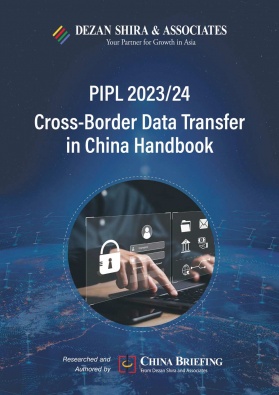Shanghai’s Lingang New Area Launches First Cross-Border Data Service Center to Facilitate Data Export
The Lingang New Area in Shanghai’s Pilot Free Trade Zone has launched a new cross-border data service center to provide administrative and consulting services to companies in Shanghai that need to export data out of China. The service center will help facilitate data export by accepting applications from companies for data export projects and is tasked with formulating and implementing data catalogs to facilitate data export in the area. The Shanghai cross-border data service center will provide services to companies across the whole city.
The Lingang New Area in the Shanghai Pilot Free Trade Zone has launched China’s first Cross-Border Data Service Center (the “service center”). The service center, which is jointly operated by the Cybersecurity Administration of China (CAC) and the local government, aims to further facilitate legal, safe, and convenient cross-border data transfer (CBDT) mechanisms for companies.
The service center will not only serve companies in the Lingang New Area but is also open to companies across Shanghai, and will act as an administrative service center specializing in CBDT.
Background
Under China’s Personal Information Protection Law (PIPL), companies that wish to export certain volumes and types of personal information (PI) or important data outside of China must undergo certain compliance procedures. Over the past year, China has been striving to ease the compliance burden for companies that need to export data out of China. This includes giving special allowances to free trade zones to implement their own rules for CBDT, including localized data catalogs and export rules.
In January 2024, the local government showcased a set of trial measures for the “classified and hierarchical” management of CBDT in the Lingang New Area. The measures, which have not yet been released to the public, seek to facilitate CBDT from the area by dividing data for cross-border transfer into three different risk categories: core, important, and general data.
The local government also pledged to release two data catalogs: a “general data” catalog, which will include types of data that can be transferred freely out of the Lingang New Area, and an “important data” catalog, which will be subject to restrictions. According to Zong Liang, an evaluation expert at the service center, the first draft of the general data catalog has been completed and is being submitted to the relevant superior departments for review.
In March 2024, the CAC released the final version of a set of regulations significantly facilitating CBDT for companies in the country. The new regulations increase the limits on the volume of PI that a company can handle before it is required to undergo additional compliance procedures, provide exemptions from the compliance procedures, and clarify the handling of important data.
Also in March, China released a new set of technical standards stipulating the rules for classifying three different types of data – core, important, and general data. Importantly, the standards provide guidelines for regulators and companies to identify what is considered “important” data. This means they will act as a reference for companies and regulators when assessing the types of data that can be exported, including FTZs such as the Lingang New Area.
How the service center will work
The service center will provide consultation on CBDT for companies, and accept and handle applications for CBDT permission and allowances. At the time of writing, neither the CAC nor the local government have publicized details on how to apply for CBDT with the service center.
Ding Rui, director of the cross-border data service center, stated that the center will provide companies with comprehensive and full-process cross-border data services, including accepting materials and conducting business consultations. He also stated the government will create a “green channel” for cross-border data flows in the free trade zone.
According to reporting from Yicai, the service center will also be tasked with conducting initial inspections of the applications. If the company fails the initial inspection, it will be issued a notice of the failure. If the initial inspection is passed, the materials will be submitted to the Shanghai Municipal Committee of the CAC for a preliminary review. Companies will be informed of the status of each stage of the application, including inspection, approval, acceptance, and evaluation results.
In addition to handling applications, the service center will undertake certain tasks of the Lingang New Area Management Committee, including accepting inquiries and activities based on general data inventory submitted by the public. Under the guidance of the Shanghai Municipal Committee of the CAC, the service center will also participate in the data classification and grading work of the Lingang New Area Management Committee and help to research, formulate, and implement negative lists.
In addition to the service center, Shanghai has simultaneously launched the Lingang New Area Cross-Border Data Public Service Management Platform (the “management platform”), which will also provide functions, such as online submission of materials, project declaration, and application results inquiry.
Several companies have reportedly already submitted applications to the service center for the approval of data export. For instance, Yifang Health is applying for approval of the cross-border flow of medical data, converting sensitive PI, which is strictly regulated, into general data to allow for easier export. This will facilitate collaboration and communication between domestic and overseas hospitals.
Ding Rui said that the next step for the Lingang New Area Data Cross-Border Service Center will be to conduct research and exploration work on docking with international high-standard economic and trade rules under the guidance of the Cyberspace Administration of the Municipal Party Committee. This is expected to form Chinese standards and promote them overseas.
About Us
China Briefing is one of five regional Asia Briefing publications, supported by Dezan Shira & Associates. For a complimentary subscription to China Briefing’s content products, please click here.
Dezan Shira & Associates assists foreign investors into China and has done so since 1992 through offices in Beijing, Tianjin, Dalian, Qingdao, Shanghai, Hangzhou, Ningbo, Suzhou, Guangzhou, Haikou, Zhongshan, Shenzhen, and Hong Kong. We also have offices in Vietnam, Indonesia, Singapore, United States, Germany, Italy, India, and Dubai (UAE) and partner firms assisting foreign investors in The Philippines, Malaysia, Thailand, Bangladesh, and Australia. For assistance in China, please contact the firm at china@dezshira.com or visit our website at www.dezshira.com.
- Previous Article Annual CIT Reconciliation in 2024 – A Brief Guide for Companies
- Next Article Case Study: Strategy and Timing for Success in Cross-Border Dispute Resolution

























